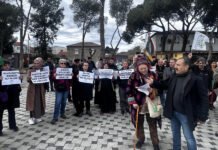A Turkish court has ordered access to a song by one of the country’s most popular pop singers to be blocked on digital platforms after a request from the Ministry of Family and Social Services, the İlke TV news website reported.
The track, titled “Perperişan” (Devastated) was released by Mabel Matiz, whose songs frequently dominate Turkish music charts. It will be restricted under Article 8/A of Turkey’s Internet Law, according to a ruling revealed by digital rights group EngelliWeb. The ban is to cover platforms including YouTube, Spotify and Apple Music. As of Thursday, however, the song remained available in Turkey.
The ministry argued in its filing that the song’s lyrics could harm family values, negatively affect children and young people, disrupt public order and cause outrage in society. It also cited public complaints submitted through the Presidential Communications Center (CİMER), saying the lyrics were “contrary to Turkish family traditions.”
The ministry did not specify which lyrics were considered problematic. However, the song includes metaphorical references to intimacy and playful language that some critics have linked to queer themes.
Matiz responded in a statement posted on X, saying his lyrics had been “deliberately misinterpreted.” He described the song as a metaphorical love story in the tradition of Turkish folk literature, emphasizing that listeners often draw personal meaning from his work.
“Songs of mine have always been inspired by many aspects of life,” he wrote. “The beauty of art and literature is that everyone can find their own meaning. This song is about love, told with playful metaphors. Nothing more.”
The court’s ruling was forwarded to Turkey’s Information and Communication Technologies Authority (BTK) for enforcement.
The decision highlights the government’s frequent use of broad censorship powers. Under Turkey’s Internet Law, authorities may block access to content deemed harmful to children, disruptive to public order or contrary to moral standards. Critics say the rules are applied vaguely and arbitrarily, allowing officials to suppress artistic and political expression.
In recent years authorities have fined broadcasters and banned music videos for allegedly violating moral values, while streaming services have faced strict licensing requirements. In 2020 the music platform Tidal was blocked after failing to comply with new regulations. More recent amendments have further expanded state power over online platforms, drawing criticism from international rights groups.
Free expression advocates argue that these measures create a chilling effect, with artists, journalists and audiences facing restrictions for content that challenges official narratives or touches on sensitive cultural themes.















